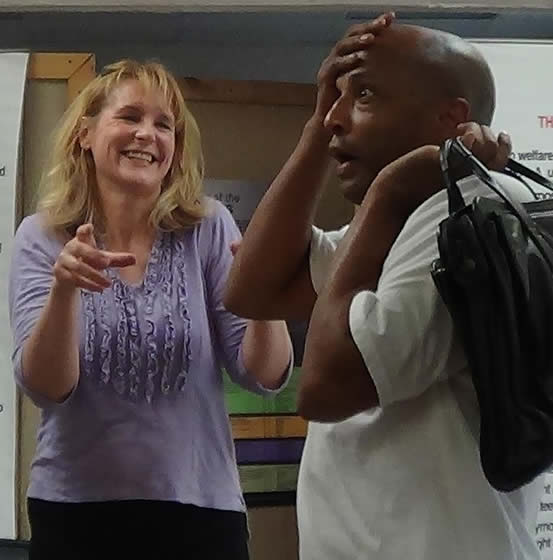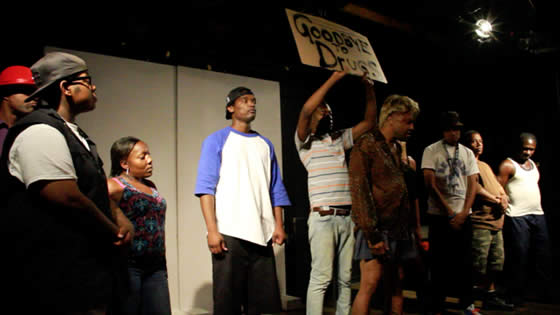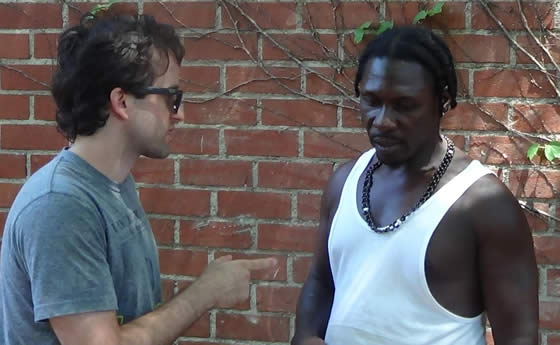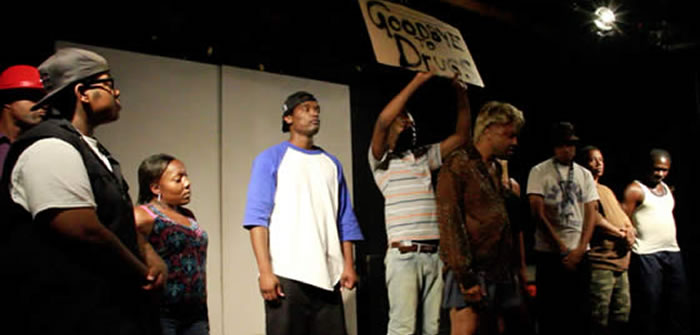2014 The Strindberg Laboratory’s project is to work with different communities to bring their voice and experiences on stage. The Strindberg Laboratory first works via email, phone etc. to encourage collect and share the participants’ stories. The second stage of the workshop is to work with the participants and develop their stories into an original play that will be performed for community members. Hustlin is the first play from The Strindberg Laboratory play writing program that’s been produced as a public performance. Before Hustlin we’ve created and performed four plays in LA County jails.
The Strindberg Laboratory is also in production of a documentary from their Hustlin project.
Bijan Tehrani: How did you come up with idea of making your documentary?
Meri Pakarinen: We first started documenting our work in our Shakespeare workshop in LA County Jail. That happened after a long process of red tape and finally getting permission to film. That was a little miracle with the bureaucracy. The filming allowed us to document how participants were transforming their behaviors and attitudes through the work of our program. The skid row program documentation began with the same desire however because of the group and the amount of time we put into the program a play that we are now performing in Los Angeles took hold. During the course of developing the play we enlisted the help of two camera people, Lucie Beecham and Taylor Fauntleroy, which made it easier to do to the documentation with better sound quality and better camera work. They are truly superb and have done one on one interviews with the actors and documented the class and the creative process. 
BT: You have done an amazing job working with America Skid row population; please tell us about the process of this effort.
MP: It all started by chance. We met a representative of the skid row program in the jails and Michael went initially to skid row to do research and interview some people for a play we were planning to do about Hustlin. The representative wasn’t clear on this and instead had Michael teach a class right there on the spot. This became a regular class once a week. I was able to join the class after few weeks. Our method has been developed from my work in Helsinki Blue workshop; a world renowned theater workshop that helps at risk youth in Finland. It starts with relaxation and then acting out scenes and events that are personal to the actors. During the course of the program the Sidewalk Studio Theatre was donated to us for possible productions and the skid row population warmed to the idea of taking these stories that we had been working on and developing an entire show about their lives. We had a lot of people drop out, go back to Hustlin in real life but we had a passionate core group who’s stuck through the whole four month process. We have had about 25 people attend our skid row program from which 8 finally stuck and now performing the show. The last person to drop out we literally lost two hours prior to our third performance on August 24th. Thank goodness we had two hours time to rehearse and cover the raps and intros. We feel that those who stuck with our play are also solid with their journey to recovery and hopefully will make it. It’s been lots of hard work, lots of fun and a hell of a learning process for both of us.
BT: You also work with prisons’ populations, how challenging has been that effort?
Michael Bierman: We’ve been working in LA County Jails now for over year and a half. We work in Men’s Central and in Lynwood with women. The challenge has not been the inmates they are willing to learn, talented and very creative and hungry to use their imagination. We are the first group to teach acting and drama in LA County Jails. One reason we were let in was because we didn’t demand anything. We promised classes without any props etc. as long as we got a space, yoga mattresses for relaxation and chairs for everyone. The biggest lesson to working in Jails is work with what you have and get out of the jail before lockdowns because you can get stuck in the jail for a long time if that happens. Somebody had proposed an acting class before but he wanted to bring props like swords etc. which doesn’t work in jail. We promised to do create all the scenes by using sensory work.
Our first workshop was in the Gay and transgender floor in MCJ Downtown. We started with animal – Shakespeare workshop and read Romeo and Juliet every class in addition to relaxation, animal work, sensory work and improvisations. The interpretations and the way the actors translated Shakespeare’s play using their own life  experiences into the scenes gave us the idea to start developing scenes and plays from their own lives instead of using Shakespeare. We learned as we went along. The most important tool that we teach in the jails is active relaxation because of the extremely stressful jail environment. What really blew us away was the willingness and creativity of the inmates to bring themselves to the work. And how much talent there is waiting to be used.
experiences into the scenes gave us the idea to start developing scenes and plays from their own lives instead of using Shakespeare. We learned as we went along. The most important tool that we teach in the jails is active relaxation because of the extremely stressful jail environment. What really blew us away was the willingness and creativity of the inmates to bring themselves to the work. And how much talent there is waiting to be used.
BT: I know that you work with no script and no budget, how is it possible?
MP: Working with no script is less of a challenge than without a budget. We ask participants to share a story that they want to share with the world i.e. Things that matter and have an impact on their lives. We help them with their ideas and how to structure and dramatize the scenes. The main thing with working without a script is having a strong dramatic structure and to give the actors a strong need and activity in their scenes. Not to have a script means with non professional actors that they have to be in the moment all the time and it stays fresh since no one knows what the other actor will exactly say at any given moment. Also it takes the pressure off memorizing which allows actors without formal training more relaxation and less responsibility. Obviously for this show everyone has done their research since they lived the life of Hustlin. Working without a budget is impossible especially when we are doing a show and a film. However we had the Sidewalk Studio Theater which was donated by SST productions and artistic director Sal Romeo and we worked with the tradition of Peter Brook and the empty space which is using as minimal stage as possible. One of our actors is a terrific artist, Marshall May, and his amazing paintings provided the scenery which gave a whole new dimension to the show and production value. We are at the point where we will have to get financial help in order to continue our work. Hopefully with people seeing the play well be able to get some donations so we can keep doing this work.
BT: What has been the results of your work and how do you pick and involve your actors?
MP: We really are glad about the positive reactions from the audiences to this show. One reason it is good theater and that is our main goal. We are not social workers so are goal is to create original and unique shows and films. Are influences are the Family Theater and  Pinero’s plays that were developed in the jails and performed in New York during the 70’s. We look for authenticity, the need to tell a story and the best dramatic way to do it. We take all kinds of people but the truth is the people who stay and continue the program have the strongest need to express so they choose us in a sense not the other way around. In this show some roles have gone through several actors but the stories have remained the same.
Pinero’s plays that were developed in the jails and performed in New York during the 70’s. We look for authenticity, the need to tell a story and the best dramatic way to do it. We take all kinds of people but the truth is the people who stay and continue the program have the strongest need to express so they choose us in a sense not the other way around. In this show some roles have gone through several actors but the stories have remained the same.
BT: Does your work bring any changes to the life of the actors?
MP: The actors have benefited from the program by getting an experience of accomplishing something they set out to do and in the process of doing the scenes and show they have learned about themselves and objectify their real life experience that they chose to act out which helps them change and become more mindful about their actions and life. And finally since the show has been a success they have the experience of succeeding in something.
BT: What are your goals in making your documentary?
MB: We want to bring the story of the process of making the play and how our lives and the lives of the actors have changed as a result of doing the show. The main goal is to bring an original documentary with a compelling story. We hope to show the film in documentary film festivals.
BT: How do you see the future of your group?
MB: The group that we are doing the show with will not last forever since the nature of the actor’s lives and them being transient. We hope that some of them will continue to collaborate with us in the future. We are continuing are program in the jails. But what is our next big project after the documentary? It is totally open at the moment. We have to take a break and see what will inspire us as actors, directors and filmmakers. As far as our current production Hustlin is concerned we are doing one more time time at the Mccadden theater in hollywood at 4 pm (http://mccaddentheatre.com) on the seventh of september for tickets and info please call us at 2132656313 or visit us at www.strindberglaboratory.com or facebook.com/strindberglaboratory

